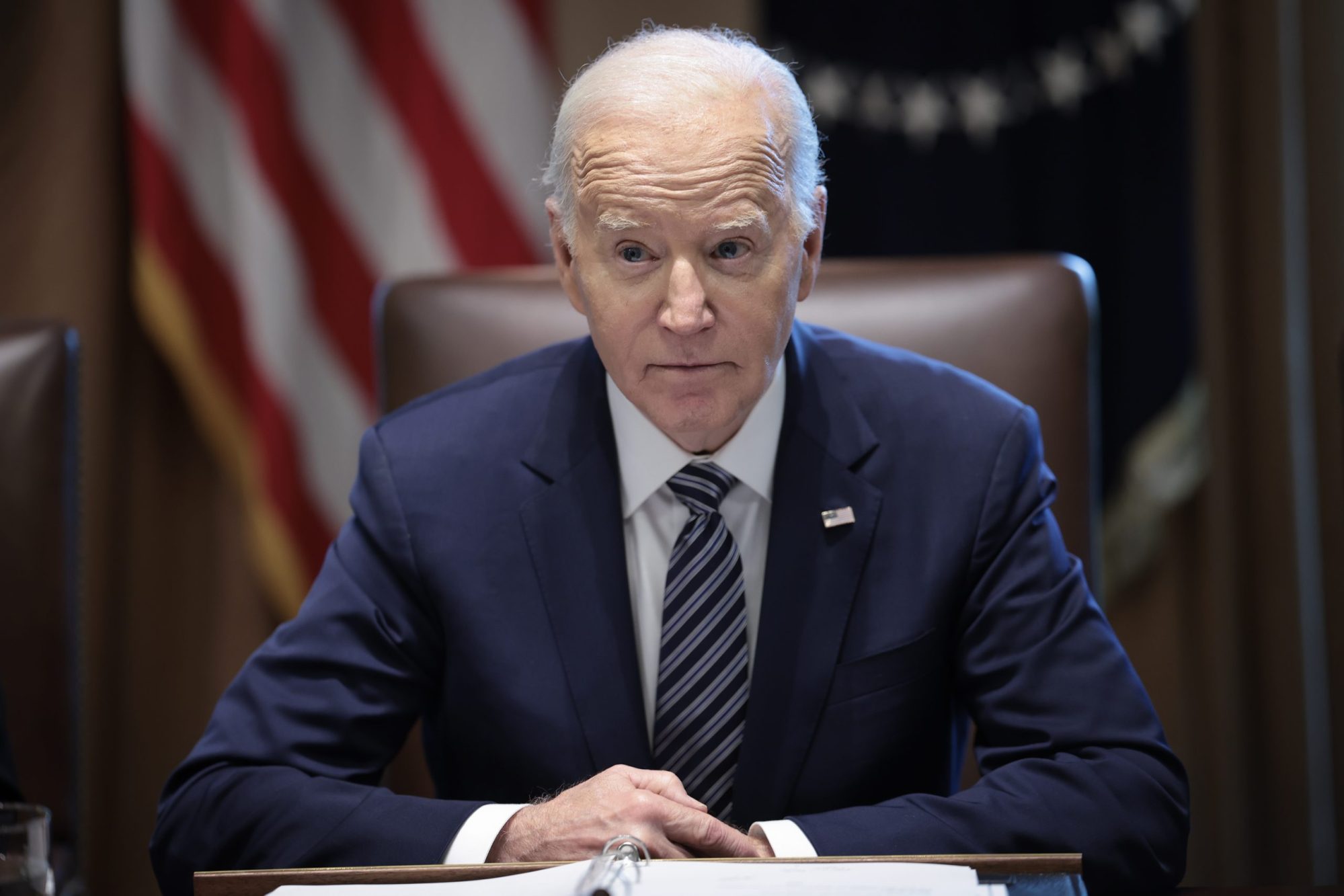In his final weeks as president of the United States, Joe Biden is using whatever remaining time and capital he has to continue his lockstep support for Israel as it continues violating the so-called ceasefire in Lebanon, as it further immiserates, starves, and destroys what remains in Gaza, and as it codifies the ethnic cleansing and permanent settlement of Northern Gaza. In a 24-hour period two weeks ago, The Times of Israel reported that the Biden White House aggressively lobbied “Democrats to reject [the] progressive push to block arms transfers to Israel” (which most ultimately did). And Biden’s UN ambassador, Robert Wood, vetoed yet another UN resolution calling for an immediate, lasting ceasefire in Gaza and a return of all Israeli hostages.
This fact is at odds with a broader excuse-making media regime that assured readers over the past few months that Biden was only backing Israel’s genocide in Gaza because he was compelled to by mysterious outside forces: a bearhug “change things from the inside” strategy, electoral considerations in the lead-up to Nov. 5, the Israel lobby, or a broader assumption he is simply too helpless to do anything. Once Biden was no longer constrained by these factors, it was assumed, the White House would finally make some effort to rein in Israel. But the election came and went and Biden’s support for Israel has only intensified, capping off with a scathing admonishment and delegitimization of the International Criminal Court, which finally issued an arrest warrant last month for Prime Minister Benjamin Netanyahu and his former Israeli defense minister, Yoav Gallant, for war crimes and crimes against humanity in Gaza.
Recently in The Nation, I detailed how this elaborate excuse-making regime emerged over the last year, and how US media helped shape, promote, and disseminate this regime to the broader public. The three major media tropes are as follows:
- Helpless Biden is any report, analysis, or opinion that describes Biden as unable to do anything to stop Israel from committing war crimes or end the war overall. This is typically framed as a “limit” to US power, often accompanied with a picture of Biden looking overwhelmed, sad, or doddering. These are sourced almost entirely by anonymous Biden aides and Biden allies in the think-tank world.
- Fuming/Deeply Concerned Biden is any report, analysis, or opinion that paints Biden as secretly upset, outraged, or privately sad or anguished about civilian casualties. These articles are also sourced almost entirely by anonymous Biden aides and Biden allies in the think-tank world.
- Third Partying is a variation of an anti-labor propaganda concept whereby corporations treat unions as somehow separate from workers and worker democracy in order to portray unions as an outside “third party.” Just the same, media reports consistently paint the United States as separate from the conflict, despite the United States being the major patron of one side, deploying troops and military hardware, assisting in military operations, providing intel, and protecting Israel at the United Nations. US media consistently frames the United States as a neutral party—even a humanitarian force—always looking (but, mysteriously, always failing) to end the conflict. This is typically done through coverage of largely fictitious cease-fire talks, whereby US media conflates efforts for a short-term pause for the purpose of hostage exchanges with “ending the war.”
To quote the late British theorist Stafford Beer, “The purpose of a system is what it does.” We can say that Biden supports genocide because, for almost 14 months, this is exactly what he has done. Everything else is window dressing, moral performance, unfalsifiable theory of mind assumptions, and collective partisan delusion. These media genres fed into a broader excuse-making regime that also includes popular assumptions about Biden being held back by electoral considerations and being subject to the undue influence of the Israel Lobby.
Biden supports genocide because, for almost 14 months, this is exactly what he has done. Everything else is window dressing, moral performance, unfalsifiable theory of mind assumptions, and collective partisan delusion.
On the issue of electoral considerations, this excuse, even if true, was never morally useful. If “winning elections” justified everything—and surely genocide would be the most extreme example of a policy that ought not be permitted simply because it could “win” an election—then every single bad thing Trump does could be defended along the same lines. Mass deportations are popular. Does this make Trump campaigning on them and carrying them out justified? Of course not.
But even accepting the logic of the excuse, it falls apart. Poll after poll shows support for an arms embargo would have helped Harris defeat Trump: The massive reduction in support from Arab and Muslim voters, young voters, and the fact that there were 6.2 million fewer votes overall compared to 2020, clearly indicates that Gaza helped depress turnout. It wasn’t the decisive factor—indeed, no single factor was—but it no doubt was a major contributor in alienating core constituencies and helped doom Harris’ campaign. And we know those running her campaign thought so because her superficial distance from Biden on Gaza was, according to a leaked internal memo prior to Biden dropping out, listed as a major factor in her favor. ”She’s broadly considered to be to Biden’s left on Israel-Palestine, an issue where he has major vulnerabilities,” it read. The day after the election (before the usual scapegoats were settled on), the New York Times reported that campaign officials “conceded that Ms. Harris had paid a price for not breaking from Mr. Biden’s support of Israel in the war in Gaza.” The premise that the general voting public was crying out for more shredded Palestinian toddlers on their social media timeline was always a dubious one. Yes, the public supports Israel in the abstract. But when asked specifically about an arms embargo and ceasefire, the public was—even despite the overwhelming power of bipartisan polarization—opposed to the Biden/Harris policy of unqualified support for Israel’s “war in Gaza.”
Another popular excuse, which often veered into antisemitism, was that Biden only backed genocide in Gaza because the Israel lobby forced him to do so. While there is obviously an influential Israel lobby in Washington, its impact is largely relegated to the margins of Congress, having recently been decisive in pushing out Cori Bush and Jamaal Bowman. Biden, a self-identified Zionist for decades, with nothing to lose in the 2024 election, early on supported the genocidal logic of Israel’s campaign in Gaza—and likely never thought much about it beyond that. While backing Israel was no doubt helpful to Biden’s rise in politics (and certainly essential to pro-Israel groups spending millions targeting Sen. Bernie Sanders in the 2020 primary), pro-Israel lobby groups had little influence over Biden in his final year in office. Even after he dropped out of his ill-fated re-election bid, even after his replacement lost the election itself, Biden continued and continues to this day to do nothing but arm, protect, and justify Israel’s countless war crimes. This is why there is a whiff of antisemitism to this popular line: If Biden had been Jewish, his ironclad commitment to Zionism would simply be seen as an earnest ideological commitment. But because he’s Catholic, there has to be dark and mysterious forces making him do bad things against his will.
But if the past 14 months have shown anything, it’s that Zionism is a colonial ideology that requires no religious or ethnic identity. It is as American as apple pie, and the simplest explanation—that Biden just agrees with Israel’s genocidal campaign and thinks it’s justified—is all there needs to be. No lobby pressure necessary.
Even after he dropped out of his ill-fated re-election bid, even after his replacement lost the election itself, Biden continued and continues to this day to do nothing but arm, protect, and justify Israel’s countless war crimes.
But these excuse-making regimes aren’t only about providing a moral cover for President Biden. They’re very much about creating—to use a vogue term of the day—a permission structure for liberals to go about the usual work of Professional Politics. They permit compartmentalization, however tenuous. This system, over the past 14 months, has allowed, above all, liberals to enjoy politics. From TikTok memes to MSNBC to the social settings of campaigns and government workers, people develop a parasocial relationship with those in power, especially those leading their own party. Uncle Joe, Joe of the Parks and Rec cameo, Obama’s lovable sidesick, Joe of the AOC selfie, Joe of the “a decent man who has done nothing wrong” fame—surely he can’t back the genocide of Palestinians. This reality is too difficult to face; it offends both our chauvinism and partisan identity which, in key ways, is more essential to people’s sense of self than religion or race. So the incentives to build these excuse-making regimes, to provide thin journalistic legitimacy for them, and to push out into our airwaves and Twitter timelines pat thought memes—“… Biden’s bear-hugging Netanyahu so he can influence him as a friend…,” “… he has to back Israel to win the 2024 election…,” “… It’s the Israel Lobby…,” “… he’s working for a ceasefire…,” “…even if he cut off Israel, it wouldn’t matter…”—is tremendous.
It is not only essential to ameliorating cognitive dissonance, it is essential to the basic functioning of civil society and our liberal body politic. So it developed, became a career-maker for many, and largely served its function. But this doesn’t make it any less of a lie. There was never any outside force compelling Biden to back the wholesale destruction of a people, and there was nothing compelling liberals to look the other way. There was nothing forcing progressives, nonprofits, labor unions to endorse Biden, or his equally pro-genocide replacement, without conditioning said endorsement on a change in Gaza policy. These were choices they made. And when it’s all said and done—when the legacy of the Biden administration is invariably written about and debated—the choices we make, more than any hand wringing or “change things from the inside” self-rationalization, are all we have and all we are.





